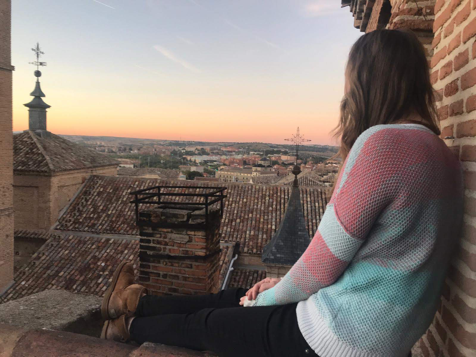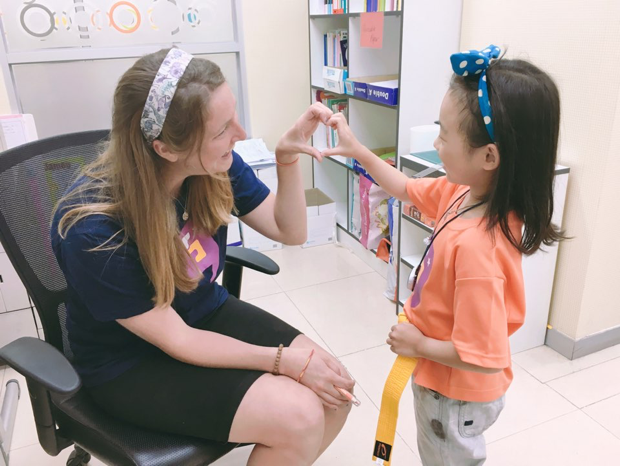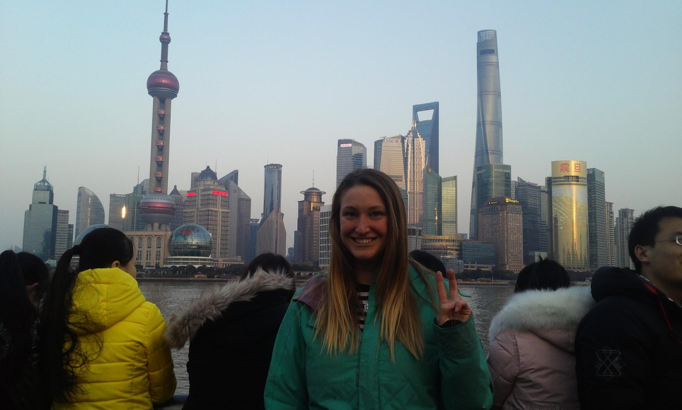- Home
- Leah Lipka
Interview with an ExpertLeah LipkaNorth American Language and Cultural Assistant, Spanish Ministry of Education |
|
Questions
1. What is your current title and where do you work?
I am a North American Language and Cultural Assistant for the Spanish Ministry of Education. I teach in a public bilingual high school and instruct course in subjects ranging from English, Technology, Art, Social Studies and Physical Education. This position is through the Spanish government and here in Spain it is called an Auxiliar de Conversacion. This is an assistantship in conjunction with my Master’s Degree in International Education through the Universidad de Alcala-Instituto Franklin.
2. What was your dream job as a kid and why?
Growing up when people asked me what I wanted to be, it would cause my a lot of stress and anxiety. For a long time, I didn’t know and I thought I had to impress people or make them comfortable by having a canned answer. All I knew for sure was that I wanted to be happy, well traveled, do good for the world and go on big adventures. Now, I have found ways to do all these things and work at the same time.
3. Tell us about your first international experience and how that influenced your career choice.
When I was 2 my parents lived in Australia for a year, although I don’t remember it I grew up hearing stories and knew the world was accessible and the importance of international exchange. When I was 12, my parents moved again but this time to Israel for 5 months. I learned a little Hebrew swam on an Israeli swim team and immersed myself in a new culture.. This was my first real taste of life abroad and kicked off a serious case wanderlust.

4. What was your first job in international education?
I became an ESL teacher in Daegu South Korea as a way to combine my love of working with children and interacting with new cultures. It was an excellent way to work, travel and meet people from all over. The job was fairly simple to land I used Dave’s ESL Cafe (Eslcafe.com) and worked with a recruiter. The process of obtaining the visa, packing up my life, selling my car and gaining the courage to board the plane was not! The requirements are generally a Bachelor’s Degree in any subject and often (but not always) a TEFL Certificate. No Korean language skills necessary although it certainly helps to be able to read, and easier thank you think to learn.
5. Describe a typical day/week at the office at your current job.
I start school at 9:15 am an generally work until 2 or 3. I have a bit of a commute on the train where I enjoy coffee and doing reading for my Master’s program. When I am teaching English, I take small groups out of the classroom for speaking activities, I prepare review activities, I try to use games and role play as often as possible. I have prepared presentation on Alaska , major holidays and life in the United States. I work with kids in Physical Education. I also tutor private lessons. Friday evenings I attend classes for Master’s.

6. What do you enjoy most about your job?
I love the chance to really get to know a culture. Working abroad is a great way to really make local connections, sink deeper into the place you are, and not just learn about a place but experience its systems, daily life and nuance. I love getting a chance to speak about my culture with the kids help open their eyes to new parts of the world and ways of life different than their own. I have them do the same for me. I also love the coffee the food and the warm, relaxed Spanish culture.
7. What is the most challenging aspect of your job?
It can be frustrating to be working in a school system that you don’t really understand. As a language assistant I am learning where and how I fit in and managing different teacher's expectations of me. I am new to this country, dusting off my language skills and learning a lot for the first time. I can feel like an outsider or that I missed the memo on something. It is all a part of the learning experience.
8. What has working in international education taught you about yourself and your own culture?
Particularly in Spain, I will find myself in a rush for no reason. I get frustrated that things take so long, restaurant service can be slower than what we are used to the US. But then I remember how hard I worked to get here and that the point is to enjoy it.When I can remember that I’m not really in a rush to get anywhere, I’II take a deep breathe and relax and enjoy the experience. I’m trying to match Spain’s pace and slow down and be in the moment.
9. Is there a value or principal from another culture that you have embraced and applied to your own life?
Korea is collective culture and whatever you have you share with the people around you.I remember some school children having a heated fight but still sharing their snacks with everyone around them. In Spain, I was extended an invitation to move in with someone during my first tutoring session with the family. People are mostly good and kind and a little trust can go a long way. I have tried to adopt this welcoming, open and empathetic attitude in my daily life.
10. Do you have a career mentor or someone that you consult with about career growth?
I met Marsha in a running club in South Korea. She ran workshops for expats preparing to return home. She helped us reflect on our experience, process new skills, create a vision for what we wanted moving forward and an action plan for how to go for it. We have kept in touch, she often offers me little bits of wisdom. I am currently teaching in Spain and she is teaching in Budapest and we plan to meet up somewhere in Europe soon.

11. Describe a moment in your career that you consider your greatest achievement.
In South Korea, I was given the task of teaching the book Number The Stars by Lois Lowry to a group of teenagers. They had never heard of the Holocaust. I felt pretty intimidated to take on such a large subject in a different language no less and I really had my work cut out for me. I was proud of the way I handled the topic, opening their eyes to past injustices and sparking thoughtful conversations about important social justice issues.
12. What’s one piece of advice that you would give your younger self in high school or college as it relates to your career?
Relax. Take a deep breathe. Follow your dreams and the things that excite you and don’t give any worry to the judgement of others. Live your life in a way that makes you happy, not a way that is easy to explain. There is plenty of value in travel, adventure and widening your perspective.
13. What type of hobbies or activities help you balance your work/life experience?
I love to swim, do yoga, run in races, write and read. Maintaining my hobbies is so important to me. It gives me time to reflect and process and when I am abroad it is a great way for me immerse and also to stay connected to my identity from home. My biggest piece of advice for someone moving abroad is to join a club doing something you love in your new country, it is a great way to connect and break out of the expat bubble while exploring your unique interests.
Check out Leah's guest blog on Lessons Abroad to get her insight on teaching in Korea here.
INTERNATIONAL EDUCATION
Our members come from different backgrounds, abilities, levels of experience, and parts of the world. Our goal is to embrace this diversity and encourage relationships across generations and experience levels for the benefit of all involved. The Global Leadership League was started by a group of women in the field of international education for the purposes of advancing women’s leadership skills, knowledge, and connections. |
HELP US HELP YOU REACH YOUR LEADERSHIP GOALS! |

